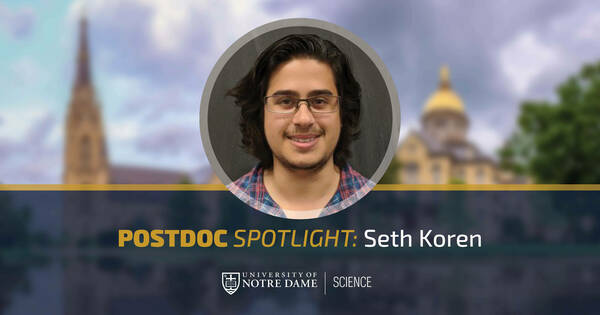
Billions of years ago, the very early universe was incredibly hot and dense — conditions could only be described as extreme. Today, physicists attempt to recreate these conditions using enormous accelerators, detectors and colliders to get particles up to the high energy that existed long ago.
The formation of our universe is a mystery that is still being unraveled, and University of Notre Dame postdoctoral researcher Seth Koren’s interests span from large scale physics to particle physics: “I want to understand fundamental physics by any means possible, using astroparticle physics, particle physics, and particle cosmology.”
Joining the Notre Dame Department of Physics this past year, Seth brings a passion for physics and a determination to unravel the intricacies of how the universe works.
A year and a half ago, Seth visited campus to give a seminar, and loved the experience. “Notre Dame has a great group in theoretical particle physics,” they said. “I have only been here a few months, but they have been very welcoming and supportive.”
“I have broad interests. I am really amazed that we can understand how the world works at a fundamental level and so I want to understand what we look like at very small distance scales — as small as we can probe — and also the history of the matter in our bodies back to minutes before the big bang,” said Seth.
“It wasn't until undergrad that I understood physics was something that you could do,” explains Seth. “Science is still ongoing and you can be a part of it. Nonetheless, I am always amazed that we can understand how the universe works. I feel very privileged to spend my time thinking about how things work at the most fundamental level.”
Scientific research is not something Seth even envisioned pursuing as a career. They described that growing up in a family where science was not endorsed made pursuing the field more difficult than others. “I was really amazed to discover science works fantastically well, and we can understand the ways our bodies work on a cellular, protein level. Biochemical processes, in these cells, allow our fantastic phenomenon of life. Plus, on smaller distances, we can understand the molecular chemical structure, and that we are made of atoms, electrons, and subatomic particles,” they explained.
In terms of future endeavors, Seth thrives in combining the many tools of physics to unlock greater research questions on the most foundational level. That being said, there is an importance on relying upon both theoretical physics and experimental research to solve these gaps in science, which is where they embrace the challenge.
Prior to Notre Dame, Seth attended University of Pennsylvania for their undergraduate degree in Physics and Math, and received a Ph.D. from UC Santa Barbara in Theoretical Particle Physics. Most recently, they were with the University of Chicago’s Enrico Fermi Institute as a postdoctoral researcher.
Originally published by at science.nd.edu on April 22, 2024.